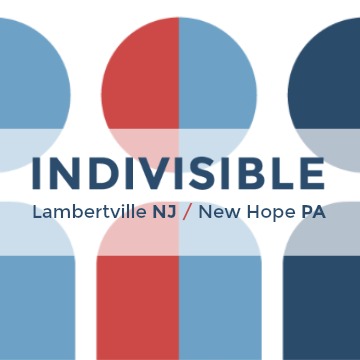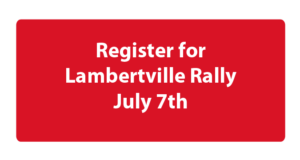Contributed by Lisa Bergson.
You can be in The Resistance and still have a life! That’s one of the great things about our movement today, as opposed to my experience as a leftist back in the late Sixties and early Seventies. In that era, we were mostly young, single, and determined to “live the revolution”, as is easiest if you are young, single, and open to a fun, but spartan lifestyle. By contrast, our local ILNH is largely comprised of established middle-aged and older folks, who are predominantly white, educated women.
Instead of smashing the state, we are writing postcards with multi-colored pens, softly chatting in friendly clusters around the tables of the suburban homes and quaint hamlets where we live. Rather than overthrow the government, we seek to reform it by promoting Democratic candidates who reflect our values, which range from liberal to progressive, depending. In an increasingly polarized and partisan nation, we wish to heal the divide and are working on ways to respectfully “Change the Conversation”. We are firmly committed to non-violent, passive resistance. And, while we don’t have flowers in our hair, our meetings have been known to open with meditation or playful dance!
Seeing women at the helm and the multitude of opportunities this poses for us is another major way our local movement departs from my Sixties experience. In that era, women like me were engaged in powerful, revelatory, life-changing consciousness-raising groups and bonding with one another. That said, we were still decidedly not “in the room where it happens” to quote from the musical, “Hamilton” (and Bolton’s book title!). In the New Left, by and large, men still ran the show, with women functioning as purveyors of food and other comforts.
I will never forget when I excitedly went to a speaking engagement downtown to hear my idol, Abbie Hoffman, founder of the Yippies, which took a playfully subversive approach to protest that I found enchanting. I stood by the exit door to greet my hero, only to have him reach out and pinch my 18-year-old belly! I couldn’t articulate how disappointed and demeaned I felt.
Determined to participate fully in the counterculture and the revolution many of us saw as inevitable, I moved to The Bay Area, where, as a non-student activist, I found lots of opportunities to engage and to grow, from exploring communal life to working on an underground paper to running Radical Therapy groups, based upon Claude Steiner’s Transactional Analysis Techniques. What I didn’t realize was that I arrived too late.
By 1970, the Vietnam War was winding down; Nixon and Kissinger (of all people) opened up China; and an event that was supposed to mark the beginning of a new political order fizzled. Among some 30 or so, gay, straight, black, and white women from the Bay Area, I helped to renovate an old yellow school bus to ferry us across the country to DC for the Black Panther Party’s Revolutionary People’s Constitutional Convention. The trip was not without incident, but somehow most of us made it, smelly lot that we were. Remember, however, that this was long before the Internet, and it was only when we arrived in the Capital that we learned that the event was basically cancelled.
Soon after, I moved to Marin County to think about what to do with the first days of the rest of my life. Like many of my Sixties cohorts, returning to school, embarking on careers, and starting families, in the context of a more peaceful and globally interdependent era, lulled us into a certain complacency. For my part, I helped to organize the National Writers Union and later protested the Iraq War, but I did not engage in any sort of on-going activism. When it came to governmental politics, I voted in national elections, but that was about it.
Fast forward to November 8th, 2016, a defining moment for so many of us. After participating in an improvised protest, which was a bit scary, with an unmarked car, driven by a large, menacing man, who hemmed us in when we got to New Hope’s Bridge Street and filmed each of us in passing, I didn’t know what to do. There was no call to action by the event’s organizer. I turned to the Newtown Democrats, whose first post-electoral meeting was literally mobbed, with folks lined up out to the bitterly cold street. The local organization was totally ill-prepared and went ahead with its usual, droning, bureaucratic meeting, while collecting everyone’s name and number. All I know is, I never heard from them.
And then, out of nowhere there was our Indivisible Lambertville/New Hope. The first Community Gatherings that I attended were jammed. There was a plan, a structure, and clear direction. We could work in different interest groups – environmental, ethics, civil rights, and more — with a central reporting team open to folks with the time and commitment to show up regularly and to participate respectfully. I was, to say the least, ecstatic to meet so many thoughtful and enthusiastic people right here, finding a community where I had long felt so isolated. It took a while to find the right niche for an outspoken, old activist like me, but working in the Civil Rights Group and contributing to our newsletter are where I belong.
Soon, our new movement will be tested as never before. Our methods and our fortitude will face severe challenges as we ramp up to the coming elections. With the tragic result of the impeachment trial in the Senate, we are on notice that the Republican party will stop at nothing, and there is nothing to stop them from corrupting our democracy and continuing to destroy our planet. Nothing, that is, except we the people. It is vital that we become more inclusive, more organized, and more united with other like-minded groups and organizations, if we are to end this nightmare. And, taking a page out of the Sixties, I wish for music, art, and poetry to foster new dreams.
In the meantime, postcard party, anyone?



